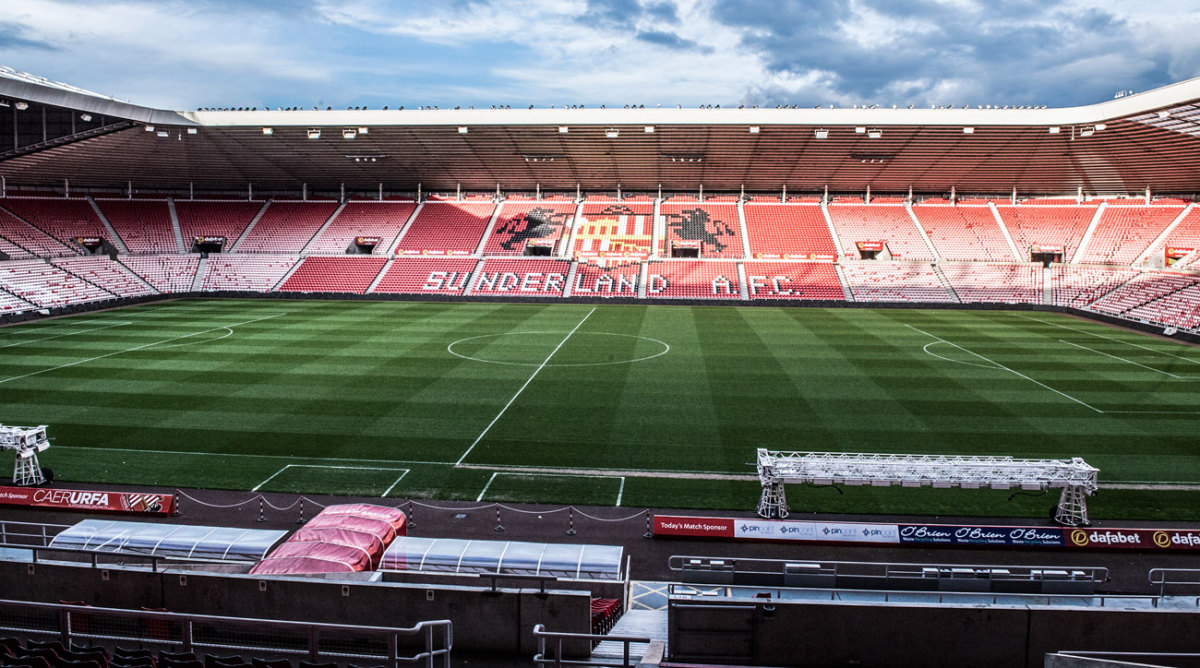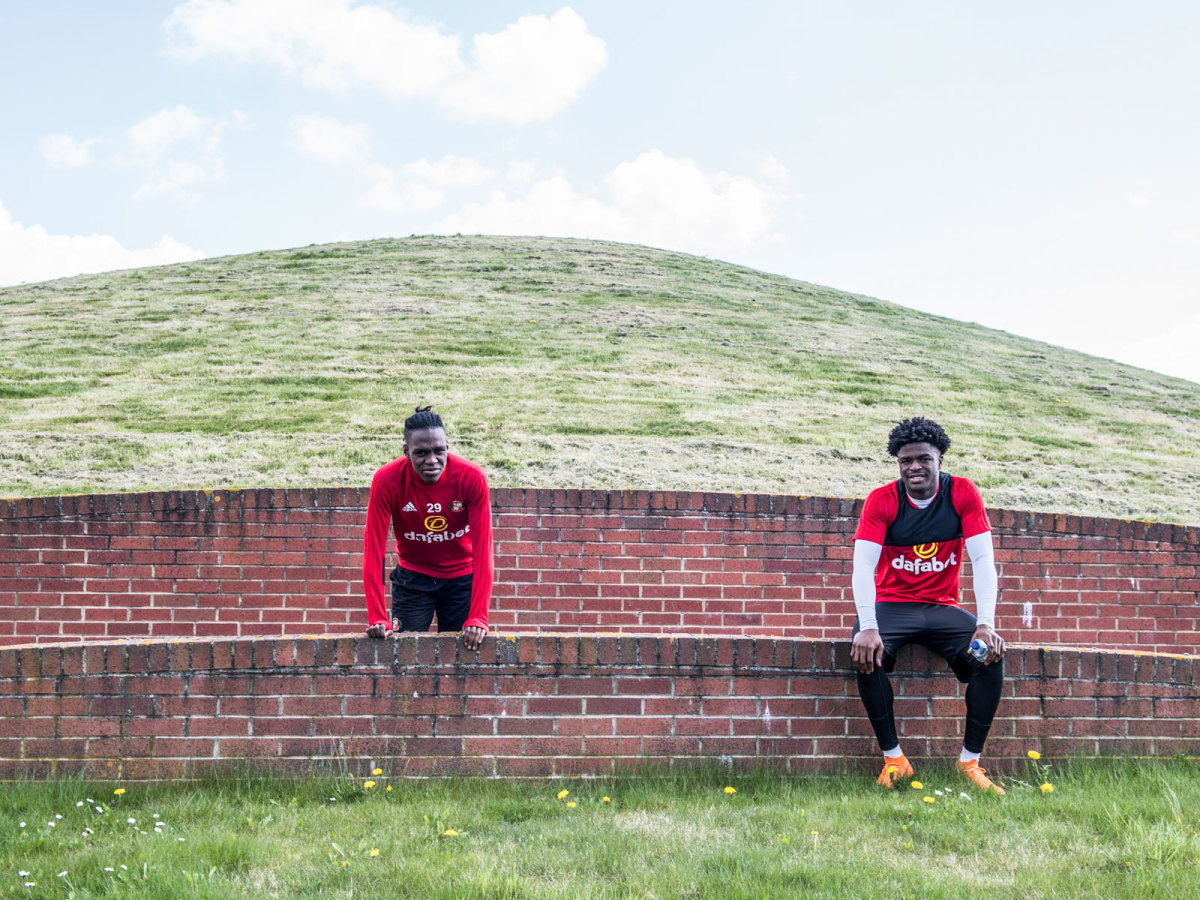Supporters Star in Superb, Unique Netflix Docuseries on Sunderland's Woes, Hope

Picture this scene: It opens inside St. Mary’s Church, a 19th-century Roman Catholic parish inside the center of Sunderland in the North East of England. The camera focuses on a packed congregation–all Sunderland AFC supporters wearing red and whites scarves–as Father Marc Lyden-Smith bows his head and leads them in prayer.
The parish, eager and melancholy, listens as Father Lyden-Smith begins. Some, unable to contain emotions, begin to cry.
“Let us pray for Sunderland football club and for our city. Help to us understand what football means in our community, show us how football can help unite, guide us to take the best out of every game,” he says. “Help us through our anger and our fury, when our team is not performing the best it can. Help the people of Sunderland and their frustration, for they are good people, who work hard.”
As he continues, the camera cuts to the city of Sunderland as a wounded, angry community looks for answers from its football club.
“Guide us in our love, for our city and our club. For it is a love born out of passion. Dear Lord, help Sunderland and all our players and their ability in all games. Grant them self-belief and a spirit of confidence, because the success of our team leads to the success and prosperity…of our city. Amen.”
This is Sunderland 'Til I Die, an eight-part docu-series from Netflix premiering on December 14, chronicling the club’s 2017-2018 tumultuous season when after 10 seasons in the Premier League, the relegated club fights in the second tier of English Football.
The project joins Netflix’s other soccer docu-shows, First Team: Juventusand Boca Juniors Confidential as well as Amazon’s All or Nothing: Manchester City as more attempts to grow soccer audiences with behind-the-scenes projects continue to surface.
But given the intimate direction and detailed production by Fulwell73 (made up of lifelong Sunderland fans, including executive producer Leo Pearlman), the project perfectly encapsulates the cultural significance of the city’s relationship with its proud, working-class supporters. As a result, Sunderland 'Til I Die, despite the club's plight, is a cut above the rest.
In many ways, the other projects (ones on Man City and Juventus in particular) provided an acceptable product, but while watching it, there was always a sense of cinematic detachment because they glamorized the clubs' stories by highlighting the team and their star players as the central characters without ever feeling like you knew them or the story itself. But by making the supporter the protagonist, Sunderland 'Til I Die does exactly the opposite, giving us a tale of raw, human emotion and exemplifying what it means to not just support a club, but also emotionally depend on it.
“Sunderland is a massive, massive footballing city. This is the lifeline, this is Sunderland, man,” says Peter Farrer, a lifelong Sunderland supporter and one of the most charismatic personalities in the series. “We’re not talking about Watford or Cambridge. We’re talking about a working-class city.”
Once the industrial envy of the world, where shipbuilding and mining in the 19th and 20th centuries underpinned the prosperity of the city and Great Britain, Sunderland is essentially part of a rust-belt narrative. Due to recent investment, its economy has recently enjoyed some prosperity, but the lifeline, the heart of this city breathes through understanding its working-class roots and the economic obstacles it has suffered through.
“Everybody in Sunderland has got a relation whose either worked in the shipyards or worked in the pits. Everybody,” says Farrer as he drives through the city, “and unfortunately those jobs have gone. Not many people have had it easy in Sunderland. It is a hard place.”

As the Black Cats gets ready for the Championship under manager Simon Grayson, the action kicks off with a preseason 5-0 loss to Celtic, and the anxiety begins. In fact, it never goes away.
“We’re a poisoned chalice,” says another recurring character and season-ticket holder, John Stirk.
Throughout the series, we see the usual shots of training and one-on-one interviews with players and members of the club, but the difference here is that the audience feels the tension and the pressure carried by the club and everyone involved. The city of Sunderland doesn’t just want the club to do well–it is desperately dependent on it.
In the third episode, as the club continues its downfall and tumbles to the bottom of the table, the club directors and manager meet with the official supporters club at a local bar to discuss the current situation. The scene is so rigid, so tense that you could cut it with a spoon–a knife is not even needed.
Days pass and Grayson is fired, becoming the shortest-serving manager in the club’s 139-year-old history, and the search for a new manager conducted by chief executive Martin Bain begins. This is where the charismatic Chris Coleman, who managed Wales for five years, enters the story, and like a hero from a children's fairytale, Coleman delivers a new sense of hope for supporters. This is an ongoing theme in the documentary: the element of hope, where no matter how bad things look, no matter how bleak the outcome, Sunderland will always believe in salvation, and it’s this sore optimism that keeps the passion alive.
Winter arrives and with it comes the dreary anticipation of the January transfer window, as fans anxiously check their phones to see which players are staying or leaving. This becomes an even bigger obstacle as owner Ellis Short announces he will no longer invest in the club, so any incoming transfer has to be a result of players going out.
But the beauty of the documentary is how it balances drama with simple touches of humanity, and places regular people and everyday moments at the core of the story. It’s a key reason why the series does not need a narrator, as everything you need to know is portrayed by these moments.
A poignant example is when snow falls on the city and youth academy players start a snowball fight with the senior team. It’s a simple albeit poetic moment that serves as a euphemism for the series as a whole, reminding the viewer that despite the turmoil, happiness is always possible. In the same manner Charles Dickens launches A Tale of Two Cities, equally we feel the same of this club and its supporters.
“It was the best of times, it was the worst of times.”
The best of British comedy has always been self-destructive, and when we talk about Sunderland’s demise, this is no different as we witness a scene where local stand-up comic and Sunderland supporter Alfie Joey describes how humor is desperately needed when you’re a Sunderland supporter. This idea becomes the central point of all his routines.
“Audiences like laughing at yourself. They don’t mind you being self-effacing,” he says. “And that’s the life of a Sunderland fan, isn’t it? You can’t be Charlie 'Big Balls,' you gotta be honest and say things are bad, and they probably always will be.”
As the season wraps, the light dims for Sunderland, and hope becomes fragile. More importantly, the fate of club employees darkens, as many jobs are on the line. Relegation is mainly seen through just a footballing perspective but we forget how those who work for the club financially depend on staying up. When Sunderland was relegated from the Premier League, 85 people were cut loose. Survival, therefore, has more than just one meaning.
“We’re human, we’ve got families. We’ve got mortgages to pay,’ says kit man John Cooke. “No one knows what will happen if the worst happens and we do get relegated into League One. Who knows what will happen? It’s frightening. I don’t think anyone is safe.”

The scene shifts back to spring, the most hopeful of seasons, as the series returns to St. Mary’s Church and Father Lyden-Smith. His sermon is about to begin, and he knows the most valuable message he can offer is hope.
“Faith and football go hand in hand. In many ways the Stadium of Light is a kind of mega church, which unites all faiths,” he says, knowing too well the fate of his club in the Championship is all but sealed.
After a dramatic win again against Derby County in the final stages of the season, hope resurfaces, but because nothing comes easy for the club, drama takes center stage once again as key player Darron Gibson gets arrested for drunk driving. As a result, he is given a two-year community order, banned from driving for 40 months and the club terminates his contract.
To no one’s surprise, the penultimate episode concludes the inevitable: Sunderland’s second consecutive relegation as the team drops to League One, but again, the show’s direction takes extra care to focus on how it affects the regular supporter. There’s perhaps nothing more symbolic than a scene at the end of the episode, inside a pub after the game and supporters cry as they sing Elvis Presley’s “I Can’t Help Falling in Love With You.”
The last episode introduces viewers to new ownership, Chris Coleman’s departure and the final game of the season, which featured a new team full of local youngsters routing the newly promoted champions Wolves 3-0. It may have been the club's last day in the Championship, but the win sparks a new sense of belief.
That’s the central theme of the series and what separates itself from the other soccer documentaries. The story refuses to glamorize the game or the players and instead highlights the community and the city. After every piece of action, there is a reaction from a supporter, as they are the ones who drive the story.
Historically, Sunderland is a giant staple of British football, having won the top division six times. Only five other clubs have done better. The academy has produced some recent talent for the national team including Jordan Henderson and Jordan Pickford. The Stadium of Light has been previously recorded as the loudest ground in the United Kingdom on more than one occasion. This series incorporates all of that into one package but never fails to place the Sunderland supporter as its chief hero.
And that's why it succeeds.
